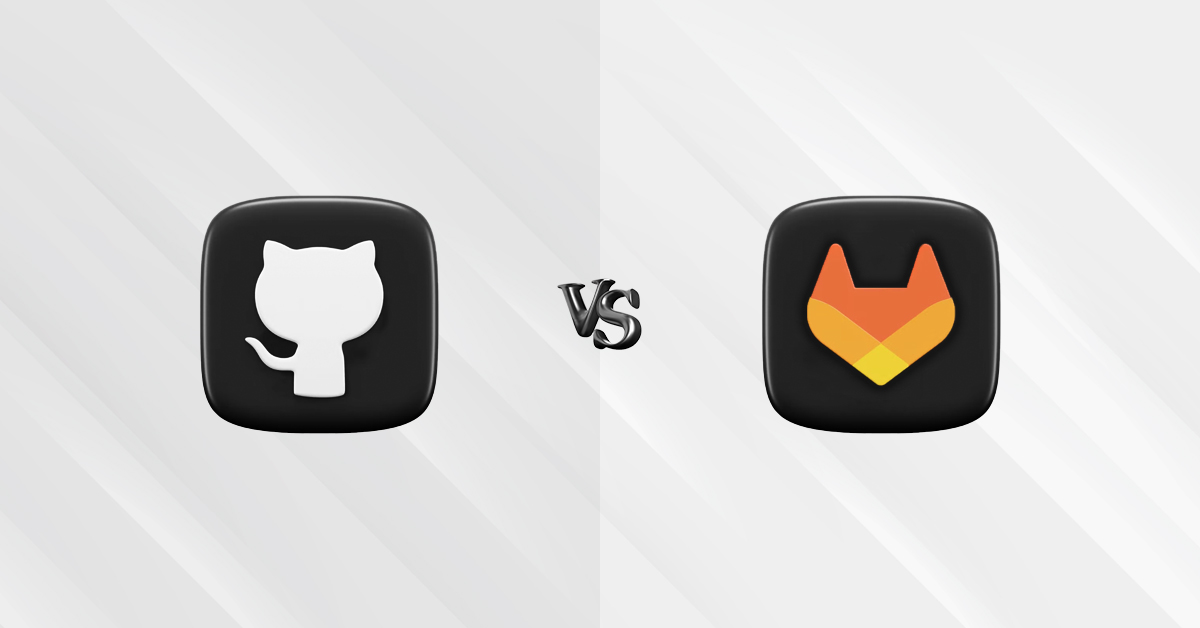GitHub vs GitLab – two powerful platforms that have revolutionized the way developers collaborate and manage their code. Whether you’re a seasoned programmer or just starting out, chances are you’ve come across these names in your coding journey. But what exactly are GitHub and GitLab? And more importantly, what sets them apart?
In this blog post, we’ll delve into the major differences between GitHub and GitLab to help you make an informed decision for your development projects. From features to advantages and disadvantages, we’ll explore it all! So sit back, grab a cup of coffee, and let’s dive into the world of version control systems: GitHub vs GitLab!
What is GitHub?
GitHub is a web-based platform that allows developers to store, manage, and collaborate on their code repositories. It uses a version control system called Git, which helps track changes made to files over time. With GitHub, developers can easily share their code with others, contribute to open-source projects, and work together on the same project simultaneously.
Features of GitHub
GitHub offers a wide range of features that make it an indispensable tool for developers and teams collaborating on projects. One of its standout features is its version control system, which allows users to track changes made to their code over time. This ensures that any modifications or updates can be easily managed and reverted if necessary.
Another notable feature of GitHub is its robust issue tracking system. Users can create issues to report bugs or suggest enhancements, allowing for efficient communication and problem-solving within the development community. Additionally, GitHub provides a platform for project management with its project boards, enabling teams to plan and organize tasks effectively.
Collaboration is at the heart of GitHub’s functionality, as it allows multiple users to work on the same codebase simultaneously through pull requests. This facilitates seamless teamwork and ensures smooth integration of changes into the main codebase.
GitHub also offers extensive integrations with other popular tools such as continuous integration/delivery services, code review platforms, and project management tools. These integrations enhance developer productivity by streamlining workflows and automating repetitive tasks.
GitHub’s rich set of features empowers developers to collaborate efficiently while maintaining control over their codebase throughout the software development lifecycle. Whether you’re working on an open-source project or managing a team in a corporate setting, GitHub provides essential tools for successful collaboration and version control.
Advantages of GitHub
- Collaboration Made Easy: One of the biggest advantages of GitHub is its ability to facilitate seamless collaboration among developers. With features like pull requests, code reviews, and issue tracking, teams can work together efficiently and effectively on projects.
- Extensive Integration Options: GitHub integrates seamlessly with a wide range of tools commonly used in software development workflows. This includes popular project management tools like Jira and Trello, as well as continuous integration services such as Jenkins and Travis CI.
- Robust Version Control System: As a distributed version control system built on Git, GitHub provides developers with a powerful toolset for managing code revisions. It allows multiple contributors to work simultaneously on different branches while ensuring the integrity of the main project.
- Hosting for Open Source Projects: GitHub has become the go-to platform for hosting open source projects due to its vast community of developers and easy discovery features. By using GitHub, open source projects gain visibility and attract potential contributors from around the world.
- Documentation and Wiki Features: In addition to hosting code repositories, GitHub offers robust documentation capabilities through its wiki feature. This makes it convenient for teams to centralize project-related information, share knowledge, and provide comprehensive documentation for their projects.
- Highly Reliable Infrastructure: With 99% uptime guarantee provided by Microsoft (which owns GitHub), users can rely on uninterrupted access to their repositories without worrying about downtime or data loss issues.
These advantages make GitHub an invaluable resource for developers seeking efficient collaboration options along with reliable version control capabilities.
Disadvantages of GitHub
While GitHub offers numerous benefits, it’s important to consider some of its disadvantages as well. One potential drawback is that GitHub has a steeper learning curve for beginners who are new to version control systems. The interface and terminology may seem overwhelming at first, especially if you’re not familiar with Git.
Another disadvantage is that the free plan on GitHub does have limitations. While it provides basic functionalities, such as public repositories and collaboration features, advanced features like private repositories require a paid subscription. This can be a deterrent for individuals or small teams on a tight budget.
Additionally, since GitHub is a centralized platform owned by Microsoft, there are concerns about data privacy and security. Some users prefer self-hosted solutions like GitLab for more control over their data and infrastructure.
Furthermore, when it comes to project management capabilities, GitHub falls short compared to other platforms like GitLab. It lacks certain essential features such as issue tracking and built-in continuous integration tools that developers may find valuable in managing their projects efficiently.
While the large community on GitHub can be advantageous in terms of open-source collaboration opportunities and finding resources, it can also make discovering meaningful contributions challenging due to the sheer volume of projects available.
Despite these drawbacks, many developers still choose to use GitHub due to its popularity within the development community and seamless integration with various third-party tools. However, weighing these disadvantages against your specific needs will help determine if GitLab or another alternative might better suit your requirements.
Top-notch DevOps Implementation Solutions will help you usher in the New Age of Software.
What is GitLab?
GitLab is a web-based DevOps platform that provides a complete set of tools for managing the entire software development lifecycle. It offers a comprehensive solution for version control, continuous integration and deployment, issue tracking, code review, and more.
Features of GitLab
GitLab is a powerful and versatile platform that offers a wide range of features for efficient software development and collaboration. Let’s explore some of its key features.
- Version Control: Like GitHub, GitLab provides comprehensive version control capabilities through its support for Git repositories. Developers can easily manage code changes, track revisions, and collaborate seamlessly.
- Issue Tracking: With built-in issue tracking functionality, GitLab allows teams to create, assign, and prioritize issues within the repository itself. This helps streamline project management processes and ensures that nothing falls through the cracks.
- Continuous Integration/Continuous Deployment (CI/CD): One major advantage of using GitLab is its robust CI/CD pipeline feature. It enables developers to automate the testing, building, and deploying of their applications in an integrated manner.
- Code Review: Collaborating on code becomes effortless with GitLab’s intuitive merge request feature. Developers can easily review each other’s code changes in a structured manner before merging them into the main branch.
- Agile Project Management: In addition to issue tracking, GitLab offers several agile project management tools such as milestones, epics, boards, and burndown charts to help teams stay organized and focused on delivering value.
- Docker Container Registry: Another highlight of GitLab is its built-in container registry that allows developers to store and share Docker images securely without relying on external services.
- Integrations: To enhance productivity even further,Gitlab integrates seamlessly with various third-party tools like Jenkins, Slack, JIRA, and many others commonly used in software development workflows.
In summary, Gitlab stands out with its comprehensive set of features that cater to different aspects of the software development lifecycle.
This makes it suitable for both small-scale projects and large enterprises looking for an all-in-one solution.
Advantages of GitLab
- Integrated CI/CD: One major advantage of GitLab is its built-in continuous integration and continuous deployment (CI/CD) capabilities. This allows developers to automate the process of building, testing, and deploying their code, resulting in faster and more efficient development cycles.
- All-in-one platform: Unlike GitHub, which primarily focuses on version control, GitLab offers a comprehensive set of tools for the entire software development lifecycle. It includes features such as issue tracking, project management, code review, and even a built-in container registry.
- Self-hosted option: GitLab provides the flexibility to self-host your repositories if you prefer to keep your code within your own infrastructure or have specific security requirements. This gives you full control over your data and allows for customization according to your organization’s needs.
- Free unlimited repositories: For those on a budget or working on open-source projects, GitLab offers free access with unlimited private repositories. This means you can collaborate with other developers without worrying about limitations or additional costs.
- Community-driven development: Being an open-source platform itself, GitLab has a strong community that actively contributes to its growth and improvement. This leads to frequent updates and enhancements based on real user feedback.
- Strong DevOps focus: With its emphasis on automation and collaboration across teams (DevOps), GitLab encourages seamless workflows between developers, operations personnel, testers, etc., enabling faster delivery of high-quality software products.
Disadvantages of GitLab
- Learning Curve: One of the main drawbacks of GitLab is its steep learning curve. While it offers a comprehensive set of features, navigating through them and understanding how to use them efficiently can be challenging for beginners. It may require some time and effort to become proficient in using GitLab effectively.
- Resource Intensive: GitLab’s self-hosted version requires significant server resources to run smoothly, especially as the number of users and repositories increases. This can be a disadvantage for smaller organizations or individuals with limited resources who may struggle to meet the hardware requirements needed for optimal performance.
- Complexity: GitLab’s extensive feature set can also lead to complexity when managing projects and workflows, particularly if you are not familiar with all its capabilities. It might take some time for teams to configure their preferred workflows and integrations, leading to potential delays in project execution.
- Limited Integrations: Compared to GitHub, which has a vast ecosystem of third-party integrations, GitLab has fewer options available. This limitation can pose challenges when trying to connect your development workflow with other tools or services that are commonly used in software development processes.
- Community Support: While GitLab does have an active community forum where users can seek help and support from fellow developers, it may not have the same level of community engagement as GitHub enjoys due to its larger user base.
- Security Concerns: Although security is one of GitLab’s key selling points, there have been occasional reports of vulnerabilities or breaches impacting certain versions or configurations of the platform.
This highlights the importance o regular updates and vigilant monitoring practices.
What are the major differences between GitHub vs GitLab?
GitHub and GitLab are both popular platforms for version control and collaboration, but they do have some key differences. One major difference is their hosting options. GitHub is primarily a cloud-based platform where you can host your repositories on the GitHub server, making it easy to access and collaborate with others. On the other hand, GitLab offers both cloud-based hosting like GitHub, as well as the option to self-host on your own servers.
Another difference is in their pricing models. GitHub offers free public repositories while charging for private repositories, making it more suitable for open-source projects. GitLab, however, provides unlimited public and private repositories for free in its community edition.
In terms of features, GitLab has an advantage when it comes to continuous integration (CI) and continuous deployment (CD). It offers built-in CI/CD pipelines that allow developers to automate testing and deployment processes easily. While GitHub does offer CI/CD through third-party integrations like Actions or Jenkins, it may require additional setup.
Furthermore, GitLab also includes built-in project management tools such as issue tracking boards and kanban boards which provide better visibility into project progress compared to GitHub’s limited project management capabilities.
Another significant difference lies in their approach towards extensibility. GitHub has a vast marketplace of integrations called “Apps” that allows users to enhance their workflows by integrating with various tools seamlessly. In contrast, GitLab takes a more integrated approach by providing a comprehensive set of features out-of-the-box without relying heavily on external plugins.
These are just a few of the major differences between GitHub and GitLab – there are many other factors you might consider when choosing between them based on your specific needs!
Which One to Choose?
After examining the major differences between GitHub and GitLab, you may be wondering which platform is the right choice for you. The truth is, there isn’t a one-size-fits-all answer. Both GitHub and GitLab offer unique features and advantages that cater to different needs.
If you are primarily focused on open-source projects or collaborating with a large community of developers, GitHub might be your best bet. It has become the go-to platform for many developers due to its vast user base and seamless integration with popular tools. Additionally, if you want access to advanced project management features like kanban boards or automated workflows through Actions, GitHub has got you covered.
On the other hand, if privacy and control over your codebase are crucial factors for you, GitLab might be worth considering. With its self-hosted option, organizations can have full control over their repositories without relying on third-party services. This level of customization appeals to companies that prioritize data security or those who prefer an on-premises solution.
The decision boils down to understanding your specific requirements as a developer or organization. Consider factors such as project size and complexity, collaboration needs, desired level of privacy/control over codebase, budget constraints (if any), and team preferences while making your choice between GitHub and GitLab.
Remember that both platforms have thriving communities willing to offer support when needed. So whichever platform you choose – whether it’s GitHub or GitLab – rest assured knowing that you’ll have access to valuable resources from experienced developers worldwide.
Now armed with knowledge about these two powerful version control systems/platforms – make an informed decision based on what aligns best with your development goals!
GitHub and GitLab are two of the most popular version control tools used in software development. While they both offer similar services, such as collaboration, code review, and sharing features, there are many differences between them. GitHub is the more widely used product due to its larger user base and multitude of integrations, but GitLab also offers a powerful suite of features that may be preferred by some developers. Ultimately each platform has its own advantages for different types of projects making it important to weigh all options carefully before making a choice.
FAQs
GitHub and GitLab are both code hosting platforms that use Git to manage code. However, there are some key differences between the two platforms. GitHub is more popular and has a larger community, while GitLab is more enterprise-focused and has more features for security and compliance.
GitHub is more popular than GitLab for a few reasons. First, GitHub has been around longer and has a larger community. Second, GitHub is more open source-friendly, which appeals to many developers. Third, GitHub has a more polished user interface.
Yes, GitLab is separate from GitHub. GitLab is an open-source project, while GitHub is a commercial product.
Whether you should use GitLab instead of GitHub depends on your specific needs. If you are looking for a more enterprise-focused platform with more features for security and compliance, then GitLab is a good choice. However, if you are looking for a more open source-friendly platform with a larger community, then GitHub is a good choice.
Yes, GitLab is free for personal use. You can create an unlimited number of private repositories for free.
GitLab can be used for a variety of purposes, including:
Collaborative software development: GitLab can be used to collaborate with other developers on software projects.
Version control: GitLab can be used to track changes to code and manage different versions of code.
Continuous integration and delivery (CI/CD): GitLab can be used to automate the process of building, testing, and deploying code.
Security and compliance: GitLab has a number of features for security and compliance, such as code scanning and vulnerability management.







